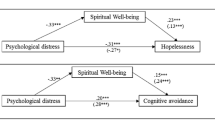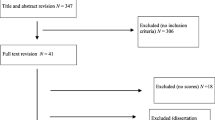Abstract
Background
Prior research on spirituality in cancer survivors has often failed to distinguish the specific contributions of faith, meaning, and peace, dimensions of spiritual well-being, to quality of life (QoL), and has misinterpreted mediation analyses with these indices.
Purpose
We hypothesized a model in which faith would have a significant indirect effect on survivors’ functional QoL, mediated through meaning and/or peace.
Methods
Data were from the American Cancer Society’s Study of Cancer Survivors-II (N = 8405). Mediation analyses were conducted with the Functional Assessment of Chronic Illness Therapy–Spiritual Well-being Scale (FACIT-Sp) predicting the mental component summary (i.e., mental functioning) as well as the physical component summary (i.e., physical functioning) of the SF-36.
Results
The indirect effect of faith through meaning on mental functioning, 0.4303 (95 % CI, 0.3988, 0.4649), and the indirect effect of faith through meaning and peace on physical functioning, 0.1769 (95 % CI, 0.1505, 0.2045), were significant.
Discussion
The study findings suggest that faith makes a significant contribution to cancer survivors’ functional QoL. Should future longitudinal research replicate these findings, investigators may need to reconsider the role of faith in oncology QoL studies.



Similar content being viewed by others
References
American Cancer Society. Cancer Treatment and Survivorship Facts & Figures 2013–2014. Atlanta, GA: American Cancer Society; 2014.
Stein KD, Syrjala KL, Andrykowski MA. Physical and psychological long-term and late effects of cancer. Cancer. 2008; 112(Suppl): 2577-2592.
Pirl WF. Evidence report on the occurrence, assessment, and treatment of depression in cancer patients. JNCI Monogr. 2004; 32: 32-39.
Foster C, Wright D, Hill H, Hopkinson J, Roffe L. Psychosocial implications of living 5 years or more following a cancer diagnosis: a systematic review of the research evidence. Eur J Cancer Care (England). 2009; 18(3): 223-247.
Feher S, Maly RC. Coping with breast cancer in later life: The role of religious faith. Psychooncology. 1999; 8(5): 408-416.
Silberfarb PM, Anderson KM, Rundle AC, Holland J, Cooper MR, McIntyre OR. Mood and clinical status in patients with multiple myeloma. J Clin Oncol. 1991; 9(12): 2219-2224.
Yates JS, Mustian KM, Morrow GR, et al. Prevalence of complementary and alternative medicine use in cancer patients during treatment. Support Care Cancer. 2005; 13(10): 806-811.
Brady MJ, Peterman AH, Fitchett G, Mo M, Cella D. A case for including spirituality in quality of life measurement in oncology. Psychooncology. 1999; 8(5): 417-428.
Cotton SP, Levine EG, Fitzpatrick CM, Dold KH, Targ E. Exploring the relationship among spiritual well-being, quality of life, and psychological adjustment in women with breast cancer. Psychooncology. 1999; 8(5): 429-438.
Krupski TL, Kwan L, Fink A, Sonn GA, Maliski S, Litwin MS. Spirituality influences health related quality of life in men with prostate cancer. Psychooncology. 2006; 15(2): 121-131.
Canada AL, Parker PA, de Moor JS, Basen-Engquist K, Ramondetta LM, Cohen L. Active coping mediates the association between religion/spirituality and quality of life in ovarian cancer. Gynecol Oncol. 2006; 101(1): 102-107.
Daugherty CK, Fitchett G, Murphy PE, et al. Trusting God and medicine: spirituality in advanced cancer patients volunteering for clinical trials of experimental agents. Psychooncology. 2005; 14(2): 135-146.
Mytko JJ, Knight SJ. Body, mind and spirit: Towards the integration of religiosity and spirituality in cancer quality of life research. Psychooncology. 1999; 8(5): 439-450.
Sherman AC, Simonton S. Faith and health: Psychological perspectives. In: Plante TG, Thoresen CE, eds. Spirit, Science, and Health: How the Spiritual Mind Fuels Physical Wellness. Westport, CT, US: Praeger Publishers/Greenwood Publishing Group; 2007: 157-175.
Stefanek M, McDonald PG, Hess SA. Religion, spirituality, and cancer: Current status and methodological challenges. Psychooncology. 2005; 14(6): 450-463.
Visser A, Garssen B, Vingerhoets A. Spirituality and well-being in cancer patients: A review. Psychooncology. 2010; 19(6): 565-572.
Masters KS, Hooker SA. Religiousness/spirituality, cardiovascular disease, and cancer: Cultural integration for health research and intervention. J Consult Clin Psychol. 2013; 81(2): 206-216.
Peterman AH, Fitchett G, Brady MJ, Hernandez L, Cella D. Measuring spiritual well-being in people with cancer: The Functional Assessment of Chronic Illness Therapy-Spiritual Well-being scale (FACIT-Sp). Ann Behav Med. 2002; 24(1): 49-58.
Yanez B, Edmondson D, Stanton AL, et al. Facets of spirituality as predictors of adjustment to cancer: Relative contributions of having faith and finding meaning. J Consult Clin Psychol. 2009; 77(4): 730-741.
MacKinnon DP. Introduction to Statistical Mediation Analysis. New York, NY: Lawrence Erlbaum Associates; 2008.
Edmondson D, Park CL, Blank TO, Fenster JR, Mills MA. Deconstructing spiritual well-being: existential well-being and HRQOL in cancer survivors. Psychooncology. 2008; 17(2): 161-169.
Nelson C, Jacobson CM, Weinberger MI, et al. The role of spirituality in the relationship between religiosity and depression in prostate cancer patients. Ann Behav Med. 2009; 38(2): 105-114.
Park CL. Religion and meaning. In: Paloutzian RF, Park CL, eds. Handbook of the Psychology of Religion and Spirituality. New York, NY: The Guilford Press; 2005: 295-314.
Park CL, Malone MR, Suresh DP, Bliss D, Rosen RI. Coping, meaning in life, and quality of life in congestive heart failure patients. Qual Life Res. 2008; 17(1): 21-26.
Canada AL, Fitchett G, Murphy PE, et al. Racial/ethnic differences in spiritual well-being among cancer survivors. J Behav Med. 2013; 36(5): 441-453.
Canada AL, Murphy PE, Fitchett G, Peterman AH, Schover LR. A 3-factor model for the FACIT-Sp. Psychooncology. 2008; 17(9): 908-916.
Murphy PE, Canada AL, Fitchett G, et al. An examination of the three factor model and structural invariance across racial/ethnic groups for the FACIT-Sp: A report from the American Cancer Society’s Study of Cancer Survivors-II (SCS-II). Psychooncology. 2010; 19(3): 264-272.
Smith T, Stein KD, Mehta, et al. The rationale, design, and implementation of the American Cancer Society’s Studies of Cancer Survivors. Cancer. 2007; 109(1): 1-12.
Stein KD, Smith T, Kim Y, et al. The American Cancer Society’s Studies of Cancer Survivors: The largest, most diverse investigation of long-term cancer survivors so far. Cancer Nurs. 2006; 106(3 Suppl): 83-85.
Ware JE, Kosinki M, Keller S. SF-36 Physical and Mental Health Summary Scales: A User’s Manual. Boston, MA: The Health Institute, New England Medical Center; 1994.
Ware JE, Sherbourne CD, The MOS. 36-item short-form health survey (SF-36). I. Conceptual framework and item selection. Med Care. 1992; 30(6): 473-483.
Baron RM, Kenny DA. The moderator-mediator variable distinction in social psychological research: Conceptual, strategic, and statistical considerations. J Pers Soc Psychol. 1986; 51(6): 1173-1182.
Ryu E, West SG, Sousa KH. Mediation and moderation: Testing relationships between symptom status, functional health, and quality of life in HIV patients. Multivar Behav Res. 2009; 44(2): 213-232.
Hayes AF. Introduction to Mediation, Moderation, and Conditional Process Analysis: A Regression-Based Approach. New York, NY: Guilford Press; 2013.
Hayes AF. The PROCESS macro for SPSS and SAS. Columbus, OH: The Ohio State University. Available at http://www.processmacro.org/. Accessibility verified March 29, 2015.
Preacher KJ, Hayes AF. Asymptotic and resampling strategies for assessing and comparing indirect effects in multiple mediator models. Behav Res Methods. 2008; 40(3): 879-891.
Fritz MS, Taylor AB, MacKinnon DP. Explanation of two anomalous results in statistical mediation analysis. Multivar Behav Res. 2012; 47(1): 61-87.
Park CL, Edmondson D, Hale-Smith A. Why religion? Meaning as motivation. In: Pargament KI, Exline JJ, Jones JW, eds. APA Handbook of Psychology, Religion, and Spirituality (Vol 1): Context, Theory, and Research. New York, NY: American Psychological Association; 2013: 157-171.
Koenig HG. Religion, spirituality, and health: The research and clinical implications. Int Sch Res Network Psychiatry. 2012; 1–33.
Meisenhelder JB, Chandler EN. Spirituality and health outcomes in the elderly. J Relig Health. 2002; 41(3): 243-252.
Fetzer Institute/National Institute on Aging Working Group. (1999). Multidimensional Measurement of Religiousness/Spirituality for Use in Health Research. Kalamazoo, MI: The Fetzer Institute. Available at http://fetzer.org/resources/multidimensional-measurement-religiousnessspirituality-use-health-research. Accessibility verified March 29, 2015.
Bredle JM, Salsman JM, Debb SM, Arnold BJ, Cella D. Spiritual well-being as a component of health-related quality of life: The Functional Assessment of Chronic Illness Therapy—Spiritual Well-Being Scale (FACIT-Sp). Relig. 2011; 2(1): 77-94.
Hall DE, Meador KG, Koenig HG. Measuring religiousness in health research: Review and critique. J Relig Health. 2008; 47(2): 134-163.
Miller WR, Thoresen CE. Spirituality, religion, and health: An emerging research field. Am Psychol. 2003; 58(1): 24-35.
Oman D. Defining religion and spirituality. In: Paloutzian RF, Park CL, eds. Handbook of the Psychology of Religion and Spirituality. 2nd ed. New York, NY: The Guilford Press; 2013: 23-47.
Pargament KI, Mahoney A, Exline JJ, Jones JW, Shafranske EP. Envisioning an integrative paradigm for the psychology of religion and spirituality. In: Pargament KI, Exline JJ, Jones JW, eds. APA Handbook of Psychology, Religion, and Spirituality (Vol 1): Context, Theory, and Research. New York, NY: American Psychological Association; 2013: 3-19.
Zinnbauer BJ, Pargament KI, Scott AB. The emerging meanings of religiousness and spirituality: Problems and prospects. J Pers. 1999; 67(6): 889-919.
Zinnbauer BJ, Pargament KI. Religiousness and spirituality. In: Paloutzian RF, Park RF, eds. Handbook of the Psychology of Religion and Spirituality. New York, NY: The Guilford Press; 2005: 21-42.
Acknowledgments
The American Cancer Society (ACS) Study of Cancer Survivors-II (SCS-II) was funded as an intramural research project conducted by the ACS Behavioral Research Center (BRC). We wish to acknowledge the cooperation and efforts of the cancer registries from the states of Arizona, California (regions 2–6), Colorado, Delaware, Illinois, Iowa, Maine, Massachusetts, Michigan, Nebraska, New Jersey, Pennsylvania, Washington, and Wyoming. We also thank the staff of the hundreds of hospitals contributing cases to the participating cancer registries; their data made this research possible. Lastly, we salute the thousands of cancer survivors, their physicians, and their loved ones who contributed to the collection of these data. The authors assume full responsibility for analyses and interpretation of these data.
Authors’ Statement of Conflict of Interest and Adherence to Ethical Standards
Authors Canada, Murphy, Fitchett, and Stein declare that they have no conflict of interest. All procedures performed in studies involving human participants were in accordance with the ethical standards of the institutional and/or national research committee and with the 1964 Helsinki declaration and its later amendments or comparable ethical standards.
Informed consent
Informed consent was obtained from all individual participants included in the study.
Author information
Authors and Affiliations
Corresponding author
About this article
Cite this article
Canada, A.L., Murphy, P.E., Fitchett, G. et al. Re-examining the Contributions of Faith, Meaning, and Peace to Quality of Life: a Report from the American Cancer Society’s Studies of Cancer Survivors-II (SCS-II). ann. behav. med. 50, 79–86 (2016). https://doi.org/10.1007/s12160-015-9735-y
Published:
Issue Date:
DOI: https://doi.org/10.1007/s12160-015-9735-y




